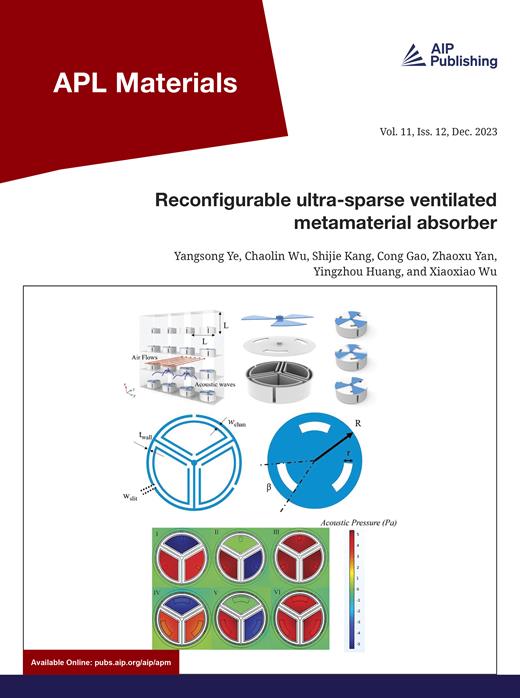Comparative performance of fluorite-structured materials for nanosupercapacitor applications
IF 5.3
2区 材料科学
Q2 MATERIALS SCIENCE, MULTIDISCIPLINARY
引用次数: 0
Abstract
Over the last fifteen years, ferroelectric (FE) and antiferroelectric (AFE) ultra-thin films based on fluorite-structured materials have drawn significant attention for a wide variety of applications requiring high integration density. AFE ZrO2, in particular, holds significant promise for nanosupercapacitors, owing to its potential for high energy storage density (ESD) and high efficiency (η). This work assesses the potential of high-performance Hf1−xZrxO2 thin films encapsulated by TiN electrodes that show linear dielectric (LD), FE, and AFE behavior. A wake-up effect is observed for AFE ZrO2, a phenomenon barely reported for pure zirconium oxide and AFE materials in general, correlated with the disappearance of the pinched hysteresis loop commonly observed for Zr-doped HfO2 thin films. ESD and η are compared for FE, AFE, and LD samples at the same electrical field (3.5 MV/cm). As expected, ESD is higher for the FE sample (95 J/cm3), but η is ridiculously small (≈55%) because of the opening of the FE hysteresis curve, inducing high loss. Conversely, LD samples exhibit the highest efficiency (nearly 100%), at the expense of a lower ESD. AFE ZrO2 thin film strikes a balance between FE and LD behavior, showing reduced losses compared to the FE sample but an ESD as high as 52 J/cm3 at 3.5 MV/cm. This value can be further increased up to 84 J/cm3 at a higher electrical field (4.0 MV/cm), with an η of 75%, among the highest values reported for fluorite-structured materials, offering promising perspectives for future optimization.用于纳米超级电容器的萤石结构材料的性能比较
过去十五年来,基于萤石结构材料的铁电(FE)和反铁电(AFE)超薄薄膜在要求高集成度的各种应用中引起了极大关注。特别是 AFE ZrO2,由于其具有高能量存储密度(ESD)和高效率(η)的潜力,因此在纳米超级电容器方面大有可为。这项研究评估了由 TiN 电极封装的高性能 Hf1-xZrxO2 薄膜的潜力,这些薄膜显示出线性介电(LD)、FE 和 AFE 行为。在 AFE ZrO2 中观察到了唤醒效应,这种现象在纯氧化锆和一般 AFE 材料中鲜有报道,它与掺杂 Zr 的 HfO2 薄膜通常观察到的挤压滞后环的消失有关。在相同电场(3.5 MV/cm)下,比较了 FE、AFE 和 LD 样品的 ESD 和 η。不出所料,FE 样品的 ESD 较高(95 J/cm3),但 η 却小得离谱(≈55%),这是因为 FE 磁滞曲线打开,导致高损耗。相反,LD 样品的效率最高(接近 100%),但ESD 却较低。AFE ZrO2 薄膜在 FE 和 LD 行为之间取得了平衡,与 FE 样品相比,损耗降低,但在 3.5 MV/cm 时,ESD 高达 52 J/cm3。在更高的电场(4.0 MV/cm)条件下,该值可进一步增加到 84 J/cm3,η 为 75%,是已报道的萤石结构材料中最高值之一,为未来的优化提供了广阔的前景。
本文章由计算机程序翻译,如有差异,请以英文原文为准。
求助全文
约1分钟内获得全文
求助全文
来源期刊

APL Materials
NANOSCIENCE & NANOTECHNOLOGYMATERIALS SCIE-MATERIALS SCIENCE, MULTIDISCIPLINARY
CiteScore
9.60
自引率
3.30%
发文量
199
审稿时长
2 months
期刊介绍:
APL Materials features original, experimental research on significant topical issues within the field of materials science. In order to highlight research at the forefront of materials science, emphasis is given to the quality and timeliness of the work. The journal considers theory or calculation when the work is particularly timely and relevant to applications.
In addition to regular articles, the journal also publishes Special Topics, which report on cutting-edge areas in materials science, such as Perovskite Solar Cells, 2D Materials, and Beyond Lithium Ion Batteries.
 求助内容:
求助内容: 应助结果提醒方式:
应助结果提醒方式:


